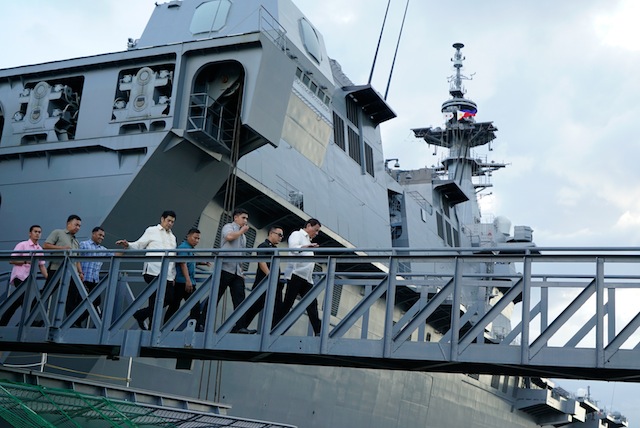
The Japanese helicopter carrier Izumo is seen in this June 4, 2017 file photo by the Malacañang Photo Service-PCOO, when the ship docked in the Philippines, and President Duterte was given a tour onboard.
Southeast Asian military officers have embarked on a four-day tour of the South China Sea on the Japanese navy’s Izumo helicopter carrier in the latest sign Japan is stepping up efforts to counter growing Chinese influence.
The officers from the 10-member Association of South East Asian Nations (ASEAN) joined the Japanese ship in Singapore on Monday, the Japanese Ministry of Defense said in an outline of the plan.
Other ASEAN military representatives will attend a separate three-day event from Tuesday in Japan, to observe Self Defense Forces (SDF) military disaster relief drills, the ministry said.
“It is the first time we have done this,” a ministry official said at a press briefing in Tokyo.
The events show a hitherto unseen degree of coordination between Japan’s military services and civilian defense officials to bolster foreign ties.
It also marks a concerted push into military diplomacy by Japan’s hawkish prime minister, Shinzo Abe.
Japan is worried that China is cementing its control in the South China Sea with the construction of island bases, arms sales and development aid. Some $5 trillion of ship-borne trade passes through the strategic waterway each year, much of it sailing to and from Japanese ports.
As Japan looks for a greater regional security role as part of its alliance with the United States, Abe’s administration believes Japan is better placed than the United States to woo Southeast Asian nations away from Chinese influence.
Japan can help bolster countries’ capabilities in disaster relief and is able to emphasize its status as a fellow Asian nation, two Japanese government officials told Reuters, asking not to be identified because they are not authorized to talk to the media.
A 2014 military coup in Thailand means that the US government has limited engagement with the regime there, while US relations with the Philippines have been strained since President Rodrigo Duterte took office last year, seeking to reduce what he sees as dependence on the United States.
Another plank of Japan’s emerging military diplomacy is military-industrial cooperation. Abe in 2014 ended a decades-old weapons export ban, allowing Japan to offer arms technology as a lure for closer military ties.
Japan last week held a military technology seminar with representatives of Thailand, Vietnam, the Philippines, Indonesia, Malaysia and Singapore.

No comments:
Post a Comment
Note: Only a member of this blog may post a comment.